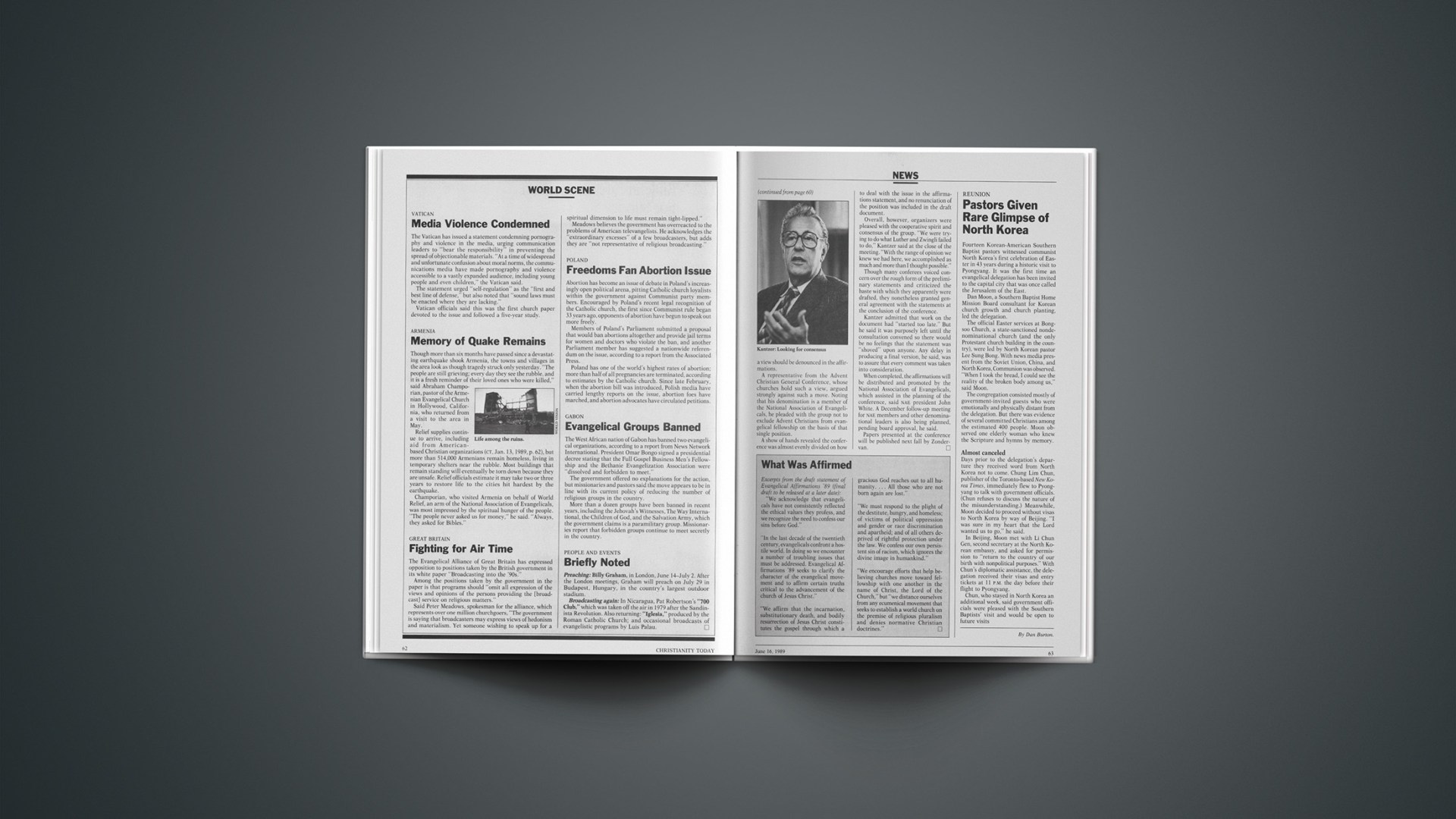The word hoax has positive connotations: many regard a hoax as a somewhat sophisticated practical joke. When the gag is over, everyone is supposed to have a good laugh.
Thus, to some, the title of Kathyrn Lindskoog’s book The C. S. Lewis Hoax (Multnomah Press, 1988) may seem misleading, for what Lindskoog implicitly alleges is not merely a practical joke with a touch of class. Rather, it is that the executor of C. S. Lewis’s literary estate, Walter Hooper, forged—or oversaw the forgery of—manuscripts he attributed to Lewis (CT, Nov. 18, 1988, p. 56). Lindskoog also maintains that Hooper has greatly misrepresented the quality and length of his relationship with Lewis.
Among those who have taken her concerns seriously is the Redlands, California-based C. S. Lewis Foundation for Higher Education, which called together 12 scholars from a variety of disciplines for a one-day colloquium on April 21. Its purpose was to evaluate Lindskoog’s book.
The panel, which included foundation president J. Stanley Mattson, isolated nearly 40 specific charges in The C. S. Lewis Hoax and evaluated them individually in accordance with the civil courtroom’s “Book of Approved Jury Instruction.” The foundation’s report on the meeting states that panel members “unanimously concluded that the major allegations levelled against [Hooper] … are wholly unsubstantiated.”
When informed of the panel’s conclusions, Lindskoog said her book’s purpose was not to prove anything but to alert her readers to “certain matters.” She added, “No book can contain within itself proof of its own accuracy.” Noting that she was denied permission to attend the colloquium, Lindskoog lamented, “Being able to prove something in court was the standard I was held to. But in court you can subpoena witnesses, you can subpoena evidence, you can take sworn testimony.”
Mattson said it would have been unfair to allow Lindskoog to be present without Hooper. He said the possibility of having both present was discussed, but deemed inappropriate.
The Publisher’S Role
In any case, Mattson argued that if Lindskoog could not prove her case in the book, it should not have been published. “Accusing a literary executor of forgery and illegal procurement of documents is analagous to accusing a banker of embezzlement,” he said. “You don’t make those charges without definitive evidence.” Mattson said he considered it “shocking” that Multnomah published the book without insisting on a physical examination of the disputed documents.
Multnomah editor Rodney Morris, who handled the project, responded, “At the time, as far as we knew, the manuscript was not available for examination.” More important, Morris said, Lindskoog’s case was based not on scientific considerations, but on considerations of writing style and of the origin of the disputed manuscripts.
The foundation’s report states that “internal stylistic analysis [is] widely viewed as the least reliable indicator of authorship.” Earlier this year a small team that included, according to Mattson, an expert in document forgery at Oxford University, examined the manuscripts in question and concluded without doubt that they were authentic. Mattson acknowledged, however, that the tests performed by the team were not exhaustive.
Jennifer Larson, a specialist in document forgery for the Antiquarian Booksellers Association of America, said she found the report supplied to the C. S. Lewis Foundation by the Oxford specialists “unconvincing.” (The report was a summary and did not include technical details.) Larson, one of 12 panel members at the colloquium, said she considered both the report and the Lindskoog book “unsubstantiated opinions,” adding, “[Lindskoog] may be absolutely right, but not on the basis of her book. I probably could find out for sure, but that’s what she should have done.”
“Inconclusive” Findings
The foundation’s report on the colloquium does not deny that Hooper has overstated his relationship with Lewis. But it states that Hooper corrected the record in his preface to the 1980 book The Weight of Glory, a collection of Lewis essays. Lindskoog said that not only is this preface “an over-long and little-read introduction,” but it still contains misleading statements.
For example, in the preface to The Weight of Glory, Hooper says that prior to meeting Lewis, he corresponded with him “for some years.” According to Lindskoog, that correspondence consisted merely of a half-dozen or so notes and brief letters.
Lewis scholar Lyle Dorsett, director of the Marion E. Wade Center at Wheaton College, called the panel’s findings “inconclusive.” Said Dorsett, “In the last analysis, [Lindskoog’s book] will be forgotten if it is full of erroneous assumptions. If it contains truth, no panel of jurists will succeed in burying it.”
Mattson said both Lindskoog and Hooper have made significant contributions to Lewis scholarship. He said the current conflict has produced considerable grief within the community of Lewis scholars. “Satan goes about like a roaring lion,” he said, “seeking whom he may devour.” Mattson expressed hope the dispute could be placed “on some kind of redemptive trajectory.”
By Randy Frame, with a report from Marjorie Chandler in Redlands, California.










